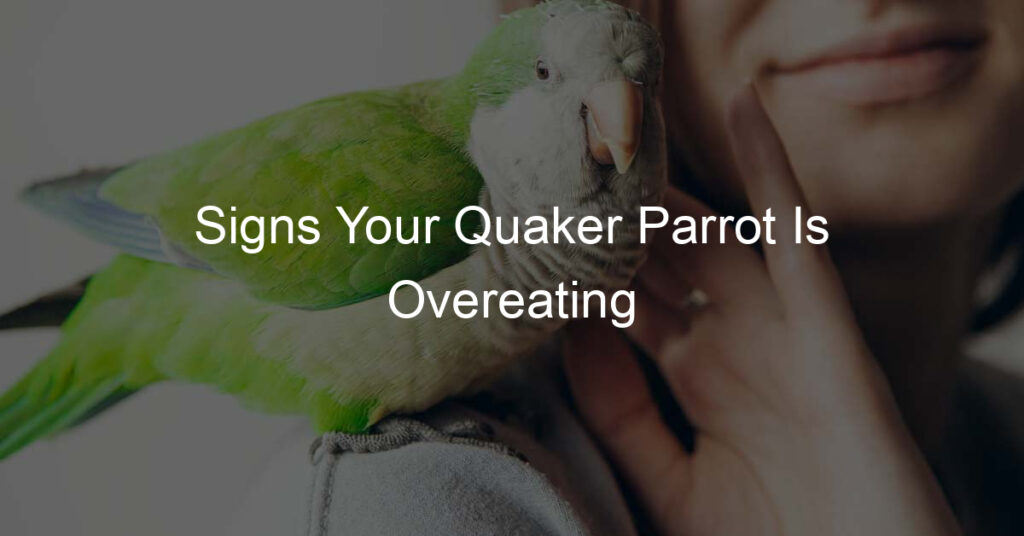Are you a Quaker parrot owner worried about your feathered friend overeating? Check out these five signs that your pet may be eating too much.
From weight gain to changes in behavior, there are several ways to tell if your beloved bird is overdoing it on the seeds and pellets. So keep an eye out for these warning signs, and make sure your Quaker parrot isn’t packing on the pounds!
How do I know if my bird is eating too much?
If you’re wondering whether your pet bird is overeating, there are a few key signs to look out for. Firstly, try to gauge whether your bird’s food dish is emptier during the day than it was in the morning.
If it’s being emptied faster than normal and you’re restocking it more frequently than before, this could be a sign of overfeeding.
Additionally, if your feathered friend is starting to look a bit podgy around the middle, this could also mean they’re chowing down on too many treats and should have their portion sizes reduced.
Finally, if they seem lethargic or irritable more often than usual, that could be another indication that they might be consuming too many calories.
If any of these signs ring true for your rockin’ feathered pal it might be worth reducing the amount (but not number!) of meals for them under careful supervision to ensure their overall health.
Can a parrot overeat?
Whether or not a parrot can overeat is a bit of a tricky question to answer. Generally, they have the same capacity to gain weight as any other bird would when they eat more than they need. So, if their diet isn’t regulated, they can become overweight quite easily.
However, many parrots are quite choosy with food and will only eat what they like; so it’s likely your parrot won’t binge-eat and develop obesity overnight!
They may even appear to be picky eaters when ingredients and nutrition are concerned, but owners should remember that providing proper nutrition for their pet is essential for its health.
How much should a Quaker parrot eat a day?
A Quaker parrot is an active little bird that needs a high-quality diet to stay healthy and happy. This type of parrot typically eats up to 3 teaspoons of a well-rounded diet per day, though some larger birds may eat more.
It’s important to choose a pellet or seed variety specifically designed for Quaker parrots and incorporate fruit, vegetables, and other enrichment items into the bird’s diet.
Supplementing with fresh foods can help your Quaker parrot get the nutrients it needs while preventing boredom caused by lack of variety in its meals. Feeding twice daily will also ensure that your Quaker parrot remains properly nourished throughout the day.
What happens if you feed a bird too much?
Feeding a bird too much can have some serious repercussions. These include increased health problems such as obesity and heart disease, hygiene issues related to overfeeding, and even certain bird behaviors that can be difficult to manage.
Overfeeding can also disrupt digestion and cause the bird to become excessively tired while digesting its food. Too much food may also cause the bird to spend more time in a cage than necessary, leading to boredom and inadequate exercise.
To maintain a healthy, balanced diet for your feathered friend, it’s important to understand how much food is appropriate for their size, breed, and individual needs.
Do birds stop eating when they are full?
Does a bird know when it’s full? It may seem like a silly question, but believe it or not, birds do have the ability to recognize when they have had enough to eat. When they’ve consumed enough food to satisfy their hunger, they stop eating and fly away.
This remarkable sense of self-regulation is something that scientists have just begun to discover and uncover through research studies.
So the next time you catch yourself glancing out your window as birds flock around your bird feeder, you can take comfort in knowing that they instinctively know when they are adequately fed.
Summing it up: Signs Your Quaker Parrot Is Overeating
All in all, Quaker parrot owners need to be aware of potential signs of overeating – from stalled growth to increased irritability – to ensure their pet remains healthy and happy.
If you should notice any behaviors suggesting your Quaker parrot is overfeeding, make sure you consult with a certified avian veterinarian as soon as possible.
Regular checkups are also essential in helping owners adjust diets if needed. Additionally, providing your bird with plenty of natural exercises and engaging activities can help keep Quaker parrots active and away from food-centric boredom.
Different types of perches and toys should be offered throughout the cage in encouraging to encourage leisurely playtime away from unhealthy meals.
Eating the right amount helps take care of the physical health of Quaker parrots so they can stay around longer, interact better with family members, and enjoy entertaining new experiences.








